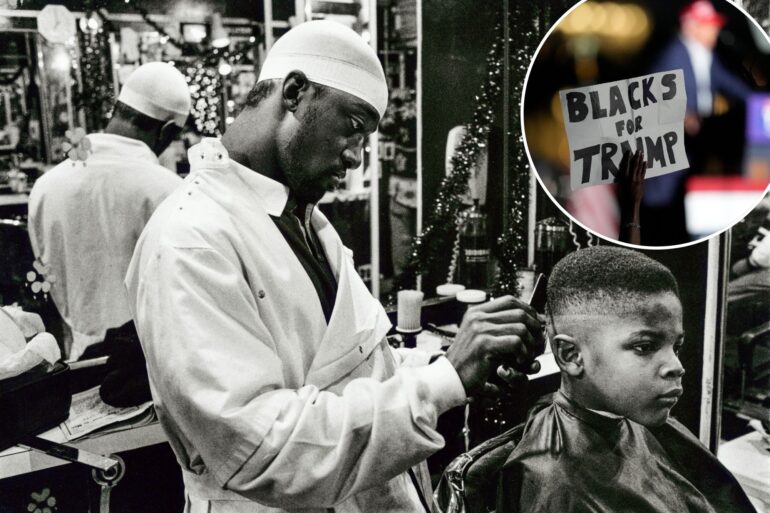🔴 Website 👉 https://u-s-news.com/
Telegram 👉 https://t.me/usnewscom_channel
While Washington settles into its new political reality, a health-care revolution is taking shape in unexpected places — your local barbershop. As the new administration prepares to implement its health-care agenda, black barbers and salon owners are quietly solving two of America’s most persistent health-care challenges: access and trust. And they’re doing it without a single congressional hearing or federal mandate.
The Washington Post via Getty Images
Here’s what most politicians and health-care executives miss: black barbershops and salons aren’t just gathering places — they’re the arteries of our communities, pumping information and trust through neighborhoods that the medical establishment has historically failed to reach. While bureaucrats debate policy in marble halls, these institutions are delivering results on Main Street.
Through my company’s partnership with Walgreens and other pharmaceutical companies, I’ve witnessed something remarkable: when health-care initiatives respect the cultural power of these spaces, real change happens. Barbers and stylists are equipped with health resources and training to connect their clients with clinical trials and essential health information. But this isn’t just about putting pamphlets in barbershops. It’s about understanding a fundamental truth: Black Americans often trust the science – it’s the scientists they don’t necessarily support.
ZUMAPRESS.com
The numbers tell a stark story: black Americans make up 13.6% of the population but only 5% of clinical trial participants. Nearly 40% report experiencing racial bias in medical settings. No government program or campaign promise can instantly fix this trust deficit. But local barbershops and salons – pillars of community trust for generations – are bridging this gap without waiting for Washington’s permission.
This isn’t a new phenomenon — it’s in our DNA. Since the turn of the 19th century, black barbershops and salons have been more than businesses; they’ve been sanctuaries where we could gather and speak freely. Unlike government initiatives that come and go, these spaces have consistently served their constituents, from hosting civil rights meetings to today’s health screenings.
With January’s inauguration on the horizon, the political compass in black America is recalibrating. Donald Trump secured record support among black voters, particularly younger black men — with nearly one-third of black men under 45 voting Republican. This moment presents the Trump administration with a golden opportunity: champion and scale the health-care efforts already happening in America’s barbershops and salons. They’ve cracked the code that Washington couldn’t — proving that when you meet people where they trust, health outcomes improve regardless of political affiliation.
REUTERS
In the time it takes to finish a haircut, a barber can dismantle generations of medical mistrust, addressing everything from vaccine hesitancy to clinical trial fears. They’re literally and figuratively becoming the Public Service Announcement system for our communities. The real transformation happens in these moments: when someone who has avoided the medical establishment finally feels safe enough to ask questions, seek help, or consider participating in research that could save lives.
Across the country, barbers and stylists who have served their communities for decades create spaces where health conversations flow naturally. It’s free-market innovation meeting community needs, proving that solutions don’t require a government program for every problem.
The success speaks volumes: participating shops have helped connect thousands to clinical trial opportunities, with enrollment rates three times higher than traditional recruitment methods. While Washington debates health-care policy changes, these community institutions are already delivering results through private enterprise and local engagement.
AFP via Getty Images
Critics might ask: Why not just improve hospital care through federal programs? The answer lies in understanding that you can’t disrupt generations of distrust with another government initiative. You need to meet people where they feel safe and respected. In black communities, that’s often the chair of a barber or stylist who’s known families for generations.
The beauty of this approach lies in its alignment with core American values: community self-reliance, private enterprise, and local solutions to local problems. While Washington debates expensive new bureaucracies, these barbershop partnerships demonstrate how free enterprise and community trust can solve problems that government intervention often complicates.
As a new administration prepares to implement its health-care agenda, remember this: real change doesn’t require new federal bureaucracies or trillion-dollar spending bills. It’s already taking shape in thousands of barbershops and salons across America, where every chair represents an opportunity to transform health outcomes through private enterprise and community trust.
J. Michael Jones – stock.adobe.com
The solution to America’s health-care trust gap won’t come from political promises or government programs. It’s already emerging through free-market partnerships between trusted community institutions and innovative companies. It’s time for policymakers to recognize that the key to community health isn’t in their legislative proposals – it’s in our barbershops, where American entrepreneurship meets community care.
That’s a health-care revolution worth supporting.
Wil Shelton, CEO of Wil Power Integrated Marketing

